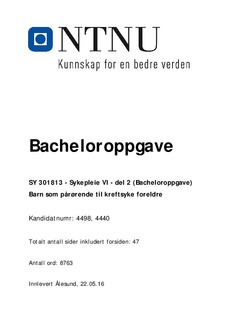Barn som pårørende til kreftsyke foreldre.
Bachelor thesis
Permanent lenke
http://hdl.handle.net/11250/2416430Utgivelsesdato
2016Metadata
Vis full innførselSamlinger
Sammendrag
Hensikt: Hensikten med litteraturstudien var å få et overblikk over hvilke erfaringer barn i aldersgruppen 6-12 år har i forbindelse med kommunikasjon, når mor eller far har fått kreft. Metode: Det er blitt gjennomført et systematisk litteratursøk i databasene Cinahl Complete, Science Direct, PubMed og Sykepleien Forskning. Det er totalt inkludert fem kvalitative og tre review artikler. Analyse av artiklene ble gjort i henhold til Forsberg og Wengstrøm's, samt Evans stegvise innholdsanalyse. Resultat: Barn oppfatter tidlig at noe er galt, ved å tolke familiens nonverbale kommunikasjon. Barn uttrykker positive erfaringer ved å bli inkludert i kommunikasjon knyttet til mor eller fars kreftsykdom- og behandlingsforløp. Barns erfaringer viser at kommunikasjon er sentralt gjennom hele forløpet for å unngå at det oppstår urealistiske fantasier, misforståelser, skyldfølelse og redsel hos barnet. Kommunikasjon med sykepleier, og andre barn i samme aldersgruppe viser seg også å gi positive erfaringer, hvor en opplever å bli forstått. Konklusjon: Barns erfaringer i forbindelse med kommunikasjon knyttet til mor eller fars kreftsykdom er at de ønsker åpen, ærlig og konkret, men tilpasset informasjon. Dette gir positive erfaringer i form av tillitt og trygghet. På denne måten kan en unngå at barn sitter igjen med ubesvarte spørsmål, og negative erfaringer i form av frykt, fantasi, skyld- og ansvarsfølelse. *** Objective: The purpose of the literature studies was to have an overview of which experience children in the age group 6-12 have in relation to communication, when a mother or father has had cancer. Method: There has been completed a systematic literature study in the database of Cinahl Complete, Science Direct and Nurses Research. There is included a total of five qualitative and three review articles. An analysis of the articles has been carried out according to Forsberg and Wengstrøm and Evans stepwise contents analysis. Results: Children realise early on that something is wrong, by interpretation of none verbal communication. Children also express positive experiences by being included in the communication related to the mother or father's cancer illness and cancer treatment. Children's experiences also show that communication is the key throughout the process to avoid creating unrealistic fantasies, misunderstandings, feelings of guilt or fear with the children. Communication with nurses and other children in the same age group also results in positive experiences, where one experiences being understood. Conclusion: Children's experiences in connection with the communication related to the mother or father's cancer is that they want open, honest and specific but appropriate information. This provides positive experiences in terms of trust and confidence. In this way, one can avoid that children are left with unanswered questions, and negative experiences in the form of fear, fantasy, guilt and a sense of responsibility.

